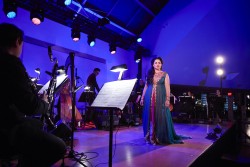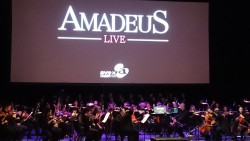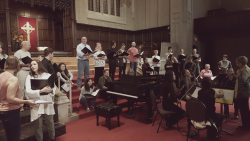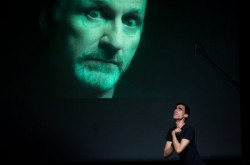Concert Report: An Evening of Osvaldo Golijov
 I’ve just completed a four-day foray into the music city we live in and the diversity of what I heard reflected the diversity of Toronto itself. It began with the opening session of the International Artist Managers’ Association (IAMA) annual conference on the morning of November 10 with a nugget-filled conversation between TSO conductor Peter Oundjian and Damascus-born, clarinetist/composer/Silk Road Ensemble-member Kinan Azmeh. From witty banter -- Azmeh talking about his early failure to learn the violin not working out because he was left-handed (“But I’m left-handed,” said Oundjian. “Some people are smarter than others,” Azmeh retorted.) -- to an illuminating and focused exploration of Azmeh’s musical life, the two musicians created a template for an ideal interview, with Oundjian interjecting enough of his personal experience to stimulate Azmeh’s telling of his own story.
I’ve just completed a four-day foray into the music city we live in and the diversity of what I heard reflected the diversity of Toronto itself. It began with the opening session of the International Artist Managers’ Association (IAMA) annual conference on the morning of November 10 with a nugget-filled conversation between TSO conductor Peter Oundjian and Damascus-born, clarinetist/composer/Silk Road Ensemble-member Kinan Azmeh. From witty banter -- Azmeh talking about his early failure to learn the violin not working out because he was left-handed (“But I’m left-handed,” said Oundjian. “Some people are smarter than others,” Azmeh retorted.) -- to an illuminating and focused exploration of Azmeh’s musical life, the two musicians created a template for an ideal interview, with Oundjian interjecting enough of his personal experience to stimulate Azmeh’s telling of his own story.
Azmeh then picked up his clarinet, moved to the centre of the Koerner Hall stage and played two duets with the Canadian-based, Sri Lankan-born pianist/composer Dinuk Wijeratne, something they first began doing 15 years ago at Juilliard. The sweet Whose Windows Are Songs and Silences, which was commissioned from Wijeratne specifically for this IAMA conference, began with the peaceful serenity of Wijeratne’s quiet piano before expanding into new territory. Quietly celebratory, it was often improvisatory, always joyous music.
That evening it was off to the Ismaili Centre for a celebration of the music of Osvaldo Golijov; the next night to the Opera House for a Zimbabwe dance party led by the great Oliver Mtukudzi. Sunday afternoon found me back in Koerner Hall for a polished performance of four Bach violin concertos by the flawless Viktoria Mullova and the Accademia Byzantina led by harpsichordist Ottavio Dantone.
Golijov once said that constant migration has been the story of his life. Born in 1960 to Eastern European parents in Argentina, he moved to Jerusalem and then to Boston, his music inspired by “inner voices,” whether they were Yiddish, Galician, Arabic or that of his muse, Dawn Upshaw. Last Thursday was the first of three evenings of Golijov’s music presented by Against the Grain Theatre. Its centrepiece was Ayre (2004), which received an exhilarating performance by Miriam Khalil and a merry band of 11 collaborators, including Jeremy Flower, on laptop/electronics, who has been performing the work since its inception.
As Golijov himself explained in his introduction, Ayre is an 11-song cycle that contains a great deal of tension with its lyrics and music from both the Muslim and the Sephardic Jewish traditions. Its ancient texts related to how Golijov perceived the world soon after 9/11 when the piece was written. “It seems like the conflicts and the beauty stay the same,” he said. “Only the actors change.”
The singer plays a number of roles in this multilingual concoction that depends on her convincing portraits to carry it off. There was a beautiful Andalusian lullaby sung by a mother who, in a paraphrase of the Lamentations of Jeremiah, is forced to eat her child; a princess who executes a captured Christian captain after he spurns her marriage proposal; a recitation of a poem by the Palestinian poet Mahmoud Darwish; a couple of Christian Arab songs from Good Friday; all concluding with a wordless song that soared from Khalil’s mouth like a sirocco blowing soft, warm and seductive. After earlier moments of impassioned singing, angry vocal rhythms, the intrinsic melody of Darwish’s spoken verse and Khalil’s profoundly moving duet with her own electronic self, that worldless climax was a siren song to a triumphant evening.
Earlier, members of the Glenn Gould School Ensemble performed Golijov’s Yiddishbbuk (1992), Lúa Descolorida (2002) and Tenebrae (2002) in three other locations in the Ismaili Centre. Second violinist Barry Shiffman took charge of Yiddishbbuk. The piece is based on a collection of apocryphal psalms Kafka read while living on Prague’s Street of the Alchemists. Shiffman, who premiered Yiddishbbuk as a member of the St. Lawrence String Quartet in the early 1990s, mined its violent pain and beauty with his intensity and passion.
Adanya Dunn’s vibrant soprano voice joined the quartet for the dolorous Lúa Descolorida, reminiscent of Cantaloube’s Songs of the Auvergne, but with a Galician edge. In Tenebrae, soprano Ellen McAteer and clarinetist Brad Cherwin, augmented by the quartet, took us from the lush darkness of the first movement to the tonal comfort of the second, on the composer’s sojourn to the solace of Yerushalem.




 Mr. Shi and His Lover
Mr. Shi and His Lover
